You searched for: ������������������������������������������������aptao168���grew
<< Previous | Displaying results 1-25 of 171 for "������������������������������������������������aptao168���grew" | Next >>
-
The SA
ArticleThe SA (Sturmabteilung) was a paramilitary organization integral to Hitler’s ascension to power. Learn more about the rise and fall of the SA.
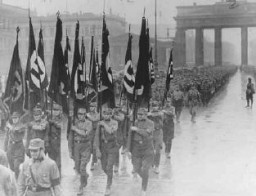
-
Sigrid Undset
ArticleSigrid Undset was a Norwegian author who won the Nobel Prize for Literature. In part because of her criticism of the Nazi regime, her work was burned in 1933.
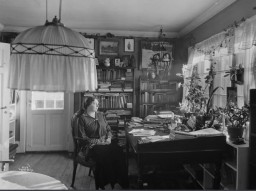
-
Zalie Waldhorn
ID CardZalie was the second of three children born to immigrant Jewish parents. Her Polish-born father was a former officer in the Austro-Hungarian army who had met and married her Hungarian-born mother during World War I. Shortly before Zalie was born, her parents settled in Paris. There, Zalie and her brother and sister grew up in a religious household. 1933-39: Zalie's mother said it was better in Paris than in the poor village in which she grew up. Her mother spoke broken French, but Zalie grew up speaking…
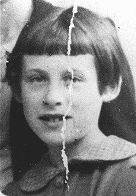
-
Robert Weinberger
ID CardRobert was raised in a German-speaking Jewish family in the Slovakian capital of Bratislava, where his father owned a dental supply business. Robert grew up bilingual: He learned Hungarian from his mother and he attended a German-language Jewish grammar school. 1933-39: When Hitler rose to power in Germany, anti-German sentiment grew in Slovakia and many Jews in Bratislava, like Robert's parents, who had originally identified with German culture, enrolled their children in Slovak schools. In March 1939…
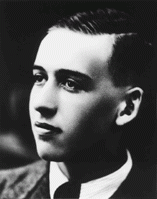
-
Janusz Korczak
ArticleJanusz Korczak ran a Jewish orphanage in Warsaw. He and his staff stayed with the children even as German authorities deported them to their deaths at Treblinka in 1942.
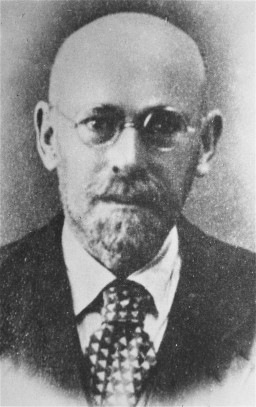
-
Eva Heyman: Maps
Media EssayEva was born to Jewish parents and grew up in a city on the border between Romania and Hungary. On March 19, 1944, the Germans occupied Hungary and Eva was soon forced into a ghetto. She was later deported to Auschwitz, where she was killed at the a...
-
Boy Scout badges
ArtifactBoy Scout handmade badges worn by German-Jewish refugee boys. British expatriates had transplanted the Boy Scouts to Shanghai before the refugees' arrival. Unlike most of the Polish Jewish refugees, German and Austrian Jews usually went to Shanghai as families, and enrollment in schools and youth organizations in the International Settlement grew rapidly. [From the USHMM special exhibition Flight and Rescue.]
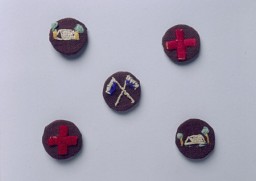
-
Franz Oppenheimer
ArticleFranz Oppenheimer was a sociologist and economist who expanded on tenets proposed by Karl Marx. Two of his works were burned under the Nazi regime in 1933. Learn more.
-
Max Brod
ArticleMax Brod was a Jewish author most widely known as the biographer and editor of Franz Kafka. His works were burned in the Nazi book burnings of 1933. Learn more.
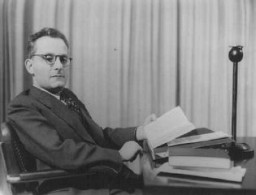
-
Theodore Dreiser
ArticleTheodore Dreiser was an American author of naturalist fiction. Censorship and bans accompanied him all his life. His works were burned in Nazi Germany in 1933.
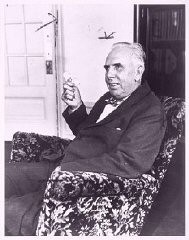
-
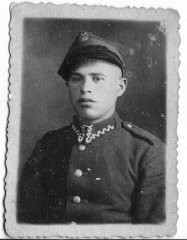
-
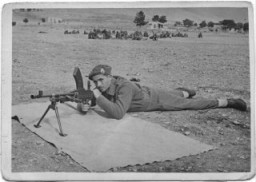
-
Joseph von Hoppen Waldhorn
ID CardJoseph was the youngest of three children born to immigrant Jewish parents. His Polish-born father was a former officer in the Austro-Hungarian army who had met and married Joseph's Hungarian-born mother during World War I. Joseph was raised in a religious household and grew up speaking French. 1933-39: Joseph's mother says it's better here in Paris than in the poor village where she grew up. Unlike his mother, who speaks broken French, Joseph and his older sisters have grown up speaking French fluently.…
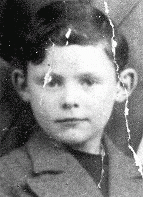
-
Inge Scheer
ID CardInge grew up in Vienna's Leopoldstadt, a large Jewish district located between the banks of the Danube Canal and the Danube River. The Scheers loved music, and Inge grew up listening to family members singing selections from popular operettas. 1933-39: Inge was 8 years old when the Germans annexed Austria in 1938 and her parents decided they'd better flee. They were smuggled illegally, via the Netherlands, to Brussels where the Jewish community helped to hide illegal refugees like Inge and her family.…
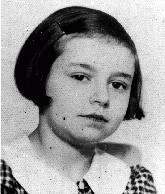
-
Ruth (Huppert) Elias
ID CardRuth grew up in Moravska Ostrava, a city in the region of Moravia with the third-largest Jewish community in Czechoslovakia. When Ruth was a child her parents divorced. She and her sister, Edith, moved in with their paternal grandmother and then with their uncle, but they kept in close contact with their father. Ruth trained to be a pianist and hoped to attend a musical academy in Prague. 1933-39: In March 1939 Bohemia and Moravia were occupied by the Germans and declared a German protectorate. That fall,…
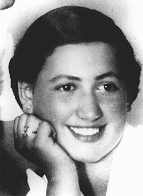
-
Jolan (Cipi) Katz
ID CardThe oldest of eight children, Jolan grew up in a religious Jewish family. She was usually known by her Yiddish nickname, Cipi. After Jolan was born, her parents moved the family to Kisvarda, a town in northeastern Hungary. There she grew up with her four sisters and one surviving brother. Jolan had finished her schooling by 1933. 1933-39: Hitler was popular in Kisvarda. Jolan's mother wanted the family to leave Hungary before the situation worsened, but her father, who had been to the United States…
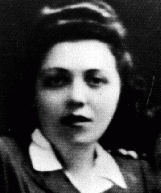
-
Fryda Litwak
ID CardFryda was one of five children born to religious Jewish parents in the industrial city of Lvov. She grew up in the same building as her paternal grandparents. Fryda attended public and private schools in Lvov, and grew up in a non-Jewish neighborhood, speaking Polish, German and Yiddish. 1933-39: When Fryda finished secondary school, she could not go to the university like her older siblings because Polish universities had instituted discriminatory quotas for Jews. In September 1939 the Germans invaded…
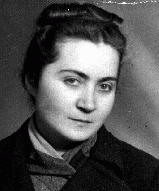
-
Collections Highlight: Selma Schwarzwald and her Bear, "Refugee"
ArticleWhile living under an assumed identity after escaping from the Lvov ghetto, Selma Schwarzwald received a toy bear that she kept with her for many years. Read about Refugee the bear.
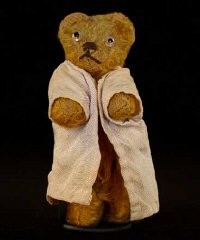
-
The Harrison Report
ArticleThe Harrison Report criticized conditions in the DP camps, called for changes in the treatment of Jewish DPs, and recommended allowing them to emigrate to the US and Palestine.
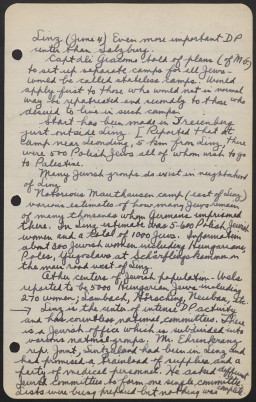
-
The Police in the Weimar Republic
ArticleThe Weimar Republic existed in Germany from 1918-1933. Learn more about German police during that time.
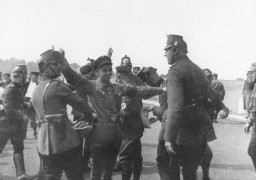
-
Making a Leader
ArticleThe Nazis used propaganda to to facilitate persecution, war, and ultimately genocide. Read more about the cult of the leader around Adolf Hitler.
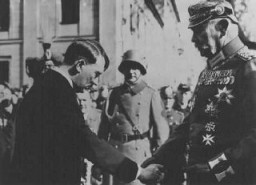
-
Jewish Community of Munkacs: An Overview
ArticleLearn about the Jewish community of Munkacs, famous for its Hasidic activity as well as its innovations in Zionism and modern Jewish education.
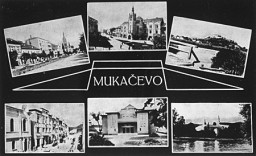
-
Landsberg Displaced Persons Camp
ArticleAfter WWII, many Holocaust survivors, unable to return to their homes, lived in displaced persons camps in Germany, Austria, and Italy. Read about Landsberg DP camp.
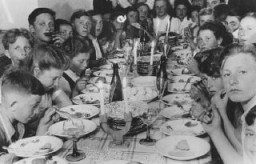
-
Otto Wels
ArticleSocial Democratic politician Otto Wels was the only German parliamentary leader to openly oppose passage of the Enabling Act, the cornerstone of Adolf Hitler's dictatorship.
-
Edward R. Murrow
ArticleUS radio and TV journalist Edward R. Murrow reported live from London during the Blitz; he also broadcast the first eyewitness account of the liberation of Buchenwald.
